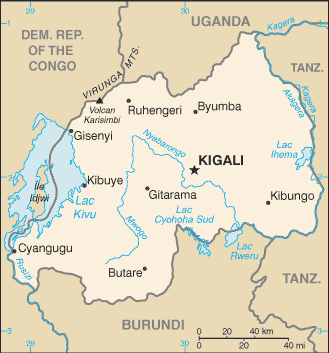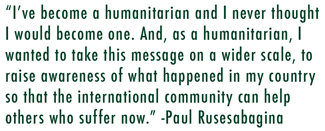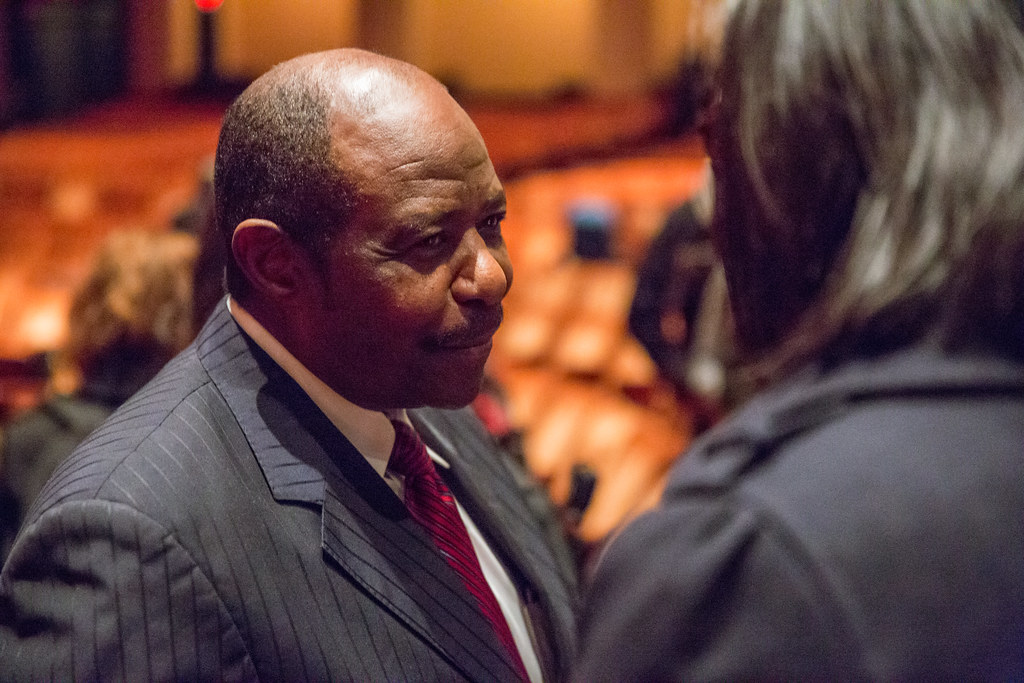 |
| Paul Rusesabagina Photo by University of Michigan via Flickr CC BY-ND 2.0 [Public Domain] |
On April 6, 1994, a 100-day run of terror and genocide took over the already divided nation of Rwanda. The two ethnic groups of Rwanda—the Hutus and the Tutsis—had long been at odds with one another, and despite some help from the United Nation to control the fighting, the Hutu extremists continued their battles with the Tutsis. When the United Nations’ peacekeepers began to be among those attacked, they withdrew most of their troops, leaving the battles to rage on. Soon the Tutsis had very few outsiders to help them survive; however one Rwandan—half Tutsi and half Hutu—stepped in. Paul Rusesabagina, the acting manager for the luxurious Hotel des Milles Collines, took in more than 1200 refugees into the hotel in effort to save them from the massacre. At the end of the 100 days, nearly a million people were murdered, most with machetes, but the refuges under Paul’s protection were unharmed.
MY HERO Suggested Video for Visitors 13 or older
Trailer for Hotel Rwanda (2004) (Rated PG-13)
Don Cheadle plays Paul Rusebaguaian in this biopic.
Paul Rusesabagina was not born, raised, nor educated to be a hero or a humanitarian. In fact, he still believes that he was just doing his job, as hotel manager; yet, Paul’s bravery, compassion, and quick thinking during the 100-day stand exemplify heroism. Paul was born to a family of farmers on June 15, 1954. His father was a Hutu and his mother was a Tutsi, and so Paul and his eight other siblings, were a blend of the two ethic groups who had been dueling in a frightening rivalry, starting decades before Paul was born. Not all Tutsis and Hutus looked to destroy one another; in fact Paul’s family wasn’t unusual, as many families were made up of the two ethnicities. However, the rebel groups among them created a ticking time bomb. Despite the turmoil, Paul went through primary and secondary school, and when he found he had a knack for hotel management, he went on to study it at Kenya Utalii College.
 |
| Map of Rwanda Photo via Wikimedia Commons [Public Domain] |
Rusesabagina worked as the assistant manager of the Hotel des Milles Collines, before being promoted to manager of the Diplomate Hotel. At the time of the 100-day genocide, Paul was managing both hotels, as the Belgian owners of the Collines had appointed him temporary manager so that they could flee for safety.
One early April day in 1994, Hutu militants rounded up Paul, his family, and other Tutsis (whom the Hutu guards called “cockroaches”), and put them on a bus. One guard handed Paul a gun and told him to shoot all the cockroaches on the bus. The idea of killing people, even if it would be to save his own life, was unacceptable to Paul, and so his mind raced to find a way to save the people on the bus. He offered the guards money if they would take him and the others to the Diplomate Hotel. They accepted the offer and drove the bus to the hotel. Paul took money from the hotel safe to give to the guards. They left, and Paul took over driving the van, reaching the relative safety of the Hotel des Milles Collines. That day was only the start of a daily routine of appeasing and bribing the guards in order to stave off killings in his hotel.
Despite every death threat, the loss of water and electricity, and the constant watch of Hutu guards, Paul remained determined to care for and protect the 1200-plus people under his watch. When the water supply was cut off, Paul resorted to the pool to quench the thirst of the people. When the guards cut the phone lines, Paul found one line that they missed. From that phone, he made desperate calls to international agencies to help end the stay, but to little avail. He needed to rely on his own intelligence, craftiness, and charm to appease the militia and help the refugees survive, even though he knew that his scheming could bring about his own death.
 |
Paul’s plan worked. Out of the 1200 refugees who spent the 100 days in the hotel no one was killed or beaten. When the Militia retreated in advance of a team of Tutsi liberators, Paul, along with his family, headed to an official refugee camp. Along the way he saw, for the first time in 100 days, the scenes of unimaginable killings. He smelled the horrific stench of dead bodies—roughly 8,000 people were killed daily in that time. Once at the camp the deaths came even closer to home. He and his wife, Tatiana, learned that many of their family members had not survived, Tatiana’s father included. They found their two young nieces had been orphaned in the slaughter. Paul and Tatiana raised the girls as their own, along with the couple’s four other children, and eventually adopted them. When the family left the refugee camp, Paul returned to Rwanda and to hotel management; but he soon found that the ethnic tensions made it difficult to continue. He and his family moved to Belgium and Paul started his own trucking company, based in Zambia, an African country south of Rwanda.
Even though he lived and worked outside of Rwanda, Rusesabagina didn’t turn his back on his native country. Despite the fact that nearly 10% of Rwanda’s population had been killed, the rest of the world seemed oblivious to the massive genocide that had taken place. He had personally experienced the inaction of the international community during the 100-day genocide and he wanted to raise awareness of other terrible crimes to a global level so that genocides such as the one that occurred in Rwanda would happen no longer.
 |
| Paul Rusesabagina Photo by University of Michigan via Flickr CC BY-ND 2.0 [Public Domain] |
Many moviemakers approached Paul about doing a movie or documentary about his experiences, but he didn’t see Hollywood as an appropriate venue to deliver his message. He changed his mind when he met director and screenwriter Terry George. Paul agreed to collaborate with George, who is known and respected for turning the stories from difficult and controversial topics into powerful and thought-provoking films. In 2004, Hotel Rwanda was released to high critical acclaim. For many viewers, it was the first time that they had heard about the genocide in Rwanda.
The following year, Paul started the Hotel Rwanda Rusesabagina Foundation (HRRF) to provide financial assistance to the women and children affected by the genocides in Rwanda and other African nations. The foundation’s vision for the future of Rwandan children is that they will have hope, learn tolerance, and experience peace within the borders of their own country. Through their work, HRRF also looks to continually turn the global community’s eye toward the genocides occurring in other countries and put an end to the violence. Paul’s efforts have brought him numerous awards, among them the Presidential Medal of Freedom, Amnesty International’s Enduring Spirit award, Peace Abbey Courage of Conscience Award.
The atrocious slaughtering committed in Rwanda provided a backdrop for a unique hero, and a lesson to the rest of the world not to turn its back on other countries that are in need of help. It is easy to stay in our own corners of the globe, consumed with our own day-to-day lives. It takes work and passion to become aware of the world around us; and when devastating events occur, those who stand up against it, save lives, and rally others to help bring about change are the true heroes. Paul Rusesabagina is one of those people.
Page created on 3/20/2006 12:00:00 AM
Last edited 6/15/2020 9:33:10 PM
**Listen Up!**
Audio Sound Bites
**On the Books**
